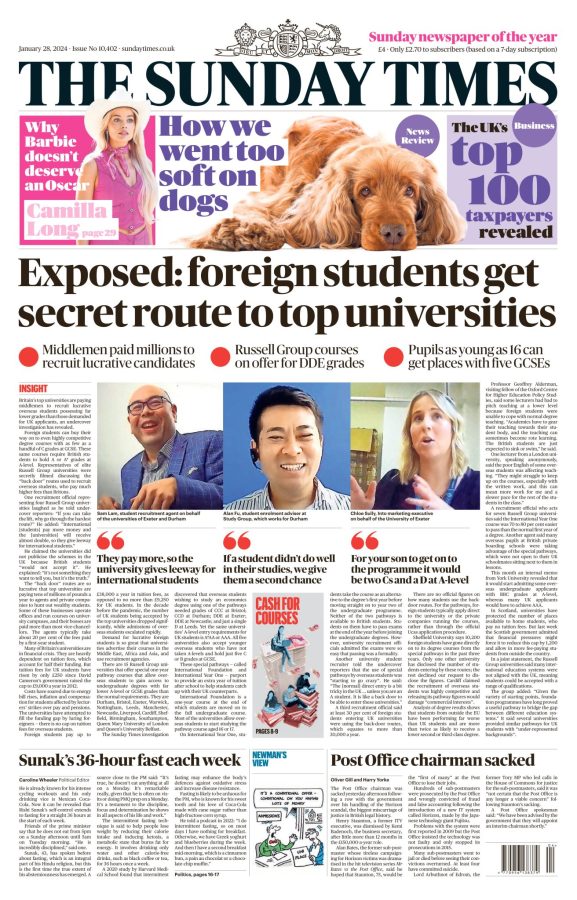Why last weekend’s sensationalist front page exposé in The Sunday Times looks set to bring further pain to a UK higher education sector under siege, and what it must do to respond.
A short editorial comment, buried on page 26 of The Sunday Times, underlined the newspaper’s agenda in running its major headline story on 28th January. British students, with perfectly good grades, are supposedly being squeezed out of the UK’s elite Russell Group universities, because of an ‘influx’ of ‘foreign students’. Inflammatory language indeed. Middle England, a primary target audience of The Sunday Times, and its lucrative advertisers, was no doubt left outraged because ‘universities are doing this for one reason: money.’
If it was not already obvious to its readers what the newspaper wanted them to conclude, the editorial spelled it out. ‘Our report will no doubt cause anger and frustration among British students and parents.’ Judging by the angry comments posted on the Times website, this is indeed what it caused.

To be fair, the editorial did also state some of the reasons we have reached this moment, although the emotive language quoted throughout the article is hardly balanced. Capped fees for domestic students, frozen at £9,250 since 2017, mean that English universities lose significant amounts of money (£4,000 a year according to the newspaper) on each undergraduate they teach. Many universities therefore rely, and seek growth from, revenues from international student tuition fees. But the ‘cash for courses’ slogan, the references to ‘middlemen paid millions’ and university entry via ‘back door routes’ is journalistic sensationalism, and lacks sufficient analysis.
A major problem for the UK HE sector is that coverage like this gives the public a distorted impression. And it bolsters the confidence of some actors in the government, in introducing short-sighted measures to counter the perceived threat.
The hapless university and agent representatives, secretly filmed advising journalists posing as parents of foreign – or more respectfully, international students (as pointed out by James Leach) – did not paint a good picture of the measures that the industry has undertaken in pursuit of quality in education counselling. The sector has not yet fully got its house in order. But despite the spin by the newspaper, achieving success on a pathway programme (whether an Undergraduate Foundation or International Year One* [see footnote] is not an easy walk in the park for many international students.
The point of both these programme types, although serving a different audience and entry point to each other, is that they offer enhanced levels of support to international students. This includes high levels of teaching contact time, English language training, and a focus on the academic study skills that may have been lacking in their home education systems. The objective is to give students a stronger chance of success on the degree proper. Many of them have to work very hard to achieve the level required to graduate from a Russell Group university, and are not guaranteed to pass the pathway component.
Studying overseas and integrating into another country is often difficult, especially when the study is in a non-native language. The reason why the business model of pathway providers has developed is to meet international students’ needs, and to support universities’ financial goals. But these pragmatic realities don’t make great copy.
It should also be remembered that British students without the requisite A-level grades also have an opportunity to pursue places at Russell Group universities, via foundation and Access to HE courses.
Blurred visions
The approach of the UK government to international students, has become increasingly damaging to the sector. Its International Education Strategy (IES) launched in 2019, called for a growth of international student numbers studying in the country to 600,000 students by 2030, a target achieved a full decade early. In the same year as the launch of the IES, the ruling Conservative Party, announced the re-introduction of a post-study work visa, now known as the graduate route visa, allowing students to seek employment in the UK for up to two years following the completion of a university degree.
By 2023 the mood music had markedly changed. After restricting the ability for students on taught Master’s degree programmes to bring dependants to the UK with them for the duration of their visas, there is a strong potential threat to the graduate route with the government having asked the Migration Advisory Council (MAC) to review it this year. The implication is that it may be further restricted, or closed. Whilst there are improvements to be made to the student visa system, to counter any abuses in it, an extreme change of policy would be catastrophic for a sector aleady under threat. It would create further damage to the reputation of the UK as a welcoming study destination to hundreds of thousands of legitimate, motivated international students each year.
Alan Beattie writes about this topic eloquently in an opinion piece in the Financial Times. Noting that the £26bn education services industry represents 8% of the UK’s total services exports. The sector’s overseas sales are greater than either the aerospace or pharmaceutical sectors. Whilst reflecting that there are issues to address, including pressure on public services and accommodation, Beattie comments that ‘the net effect of this back-and-forth is to subject a highly successful industry to big swings of policy that would be regarded as extraordinary elsewhere’.

A UK success story
What the sector must do in response
1. Focus on operational quality
This means investing in training and development for teaching staff so that they can fully support the progression goals of international students. Private sector providers are often better placed to bring the expertise, resources, and execution skills to deliver this goal, in partnership with public universities, than the universities are to do it themselves.
It also means ensuring that, from the outset, the counselling and admissions process selects students that are genuine in their objectives. A credible approach, already practiced by the vast majority of HE institutions, is to reject students early in the admissions process who cannot articulate coherent and consistent motivations, when asked for their reasons for wanting to come to the UK for higher education. This is not to say that every overseas teenager wishing to study in the UK needs to have a perfect grasp of their future career path. The sector has enhanced its quality controls significantly in the last ten years, but to win the trust of the public, and government, it must strive for continuous vigilance and improvements to its compliance processes, and be transparent about its progress. This will enable it to fully refute the accusation of providing an easy immigration route.
2. Measure and publish data on student outcomes
This point is controversial, as the required data may be seen as commercially sensitive. If institutions and companies in the HE sector want the public to believe their claims that they deliver high quality services to genuine international students, then they must aim to rigorously and consistently report on progression and degree outcomes. They must also track and report on the career journeys of a representative sample of their graduates.
3. Lobby government, and communicate to the public, with transparency
The sector has many positive points to communicate about what it achieves on behalf of the UK, and has some impressive figureheads. Vivienne Stern, Chief Executive of Universities UK, has been a leading light in promoting the standing of the nation’s international higher education sector to the public, media, and government. Stern made recent comments in response to the article in The Sunday Times. However, if the sector moves to conduct robust and regular evidence-based research on the results achieved by international students, it will give itself an even stronger platform on which to promote the positive economic and geopolitical benefits it brings to the UK.
Sign o’ the Times
With the UK government intent on cutting net inward migration by significant numbers, its policies have started to target international students as part of the problem, rather than heralding its higher education sector as a national export success.
Alan Beattie in the Financial Times: ‘blaming international students is an easy way to avoid responsibility for policy failures. But it hurts one of the most valuable export sectors for countries such as the UK, which is struggling to see where its next globally competitive industry is going to come from’.
The country should be proud of its higher education sector, and applaud its success in attracting so many international students to world-leading institutions. The government should take some responsibility for addressing the funding crisis in the UK’s higher education sector, including allowing domestic tuition fees to move closer to a sustainable market rate. Institutions and companies in the international education sector must be proactive in further improving the quality of student-facing services, operational processes and compliance controls. The Sunday Times should not pour any more fuel on the fire of anti-immigration sentiment, without providing a more rounded picture to its readers.
*Footnote
Undergraduate Foundation programmes exists to offer a bridge between different education systems, whilst helping improve English language proficiency, whereas the International Year One (IYO) programme is an alternative route to entering the second year of an undergraduate degree proper. IYO also provides addditional support and contact hours to students, relative to what they would get on a standard first year curriculum. This sparked debate, following the publication of the Sunday Times article. Alan Preece wrote a strongly worded article, in his View from a Bridge blog, stating that ‘it seems clear that international students can buy their way directly onto year one of UK university degree course via an International Year One programme operated by a private partner. The students can do this when they are not academically qualified to enter that programme directly and this opportunity is denied to UK students’.